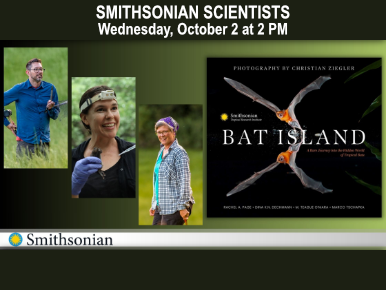| Label | Information |
|---|---|
| Dates & times |
|
| Category | Special Event |
| Age Groups | Adult |
| Location | Zoom |

McKinley Memorial Library is pleased to announce we are in partnership with the Library Speakers Consortium (LSC). The Consortium is a group of libraries that pool resources to hire well-known fiction and nonfiction adult, children's, and young adult authors to speak to their patrons. All programs are broadcast live (on Zoom) and recorded for later viewing. You can access our LSC webpage to see a list of upcoming speakers and view past recordings. You can also SUBSCRIBE to monthly event email reminders about current and upcoming speakers from the Library Speakers Consortium!
To register for this virtual event, please CLICK HERE. You do not need to have a library card to register.
Join us in kicking off October as we welcome three Smithsonian-affiliated scientists to teach us about the remarkable world of tropical bats!
For decades, scientists at the Smithsonian Tropical Research Institute have studied the remarkable biodiversity of bats on Barro Colorado Island in Panama, where an astonishing seventy-six species coexist. Now, for the first time, Smithsonian scientists’ expertise pairs with the stunning photography of National Geographic contributor Christian Ziegler for a captivating visual journey into the fascinating world of these elusive night creatures, to bring you the book Bat Island: A Rare Journey into the Hidden World of Tropical Bats.
Bats are unique among mammals: they have acquired true flight, they provide essential ecosystem services, and represent the ecologically most diverse group of mammals worldwide. Synthesizing decades-worth of intensive study, Drs. Rachel Page, Dina Dechmann, Teague O’Mara, and Marco Tschapka provide authoritative insight alongside 150 photographs that showcase bats’ extraordinary environmental adaptations and rich natural history.
This presentation will cover topics from the book, such as the diverse sensory abilities of bats, their foraging strategies, roosting ecologies, and social systems. Bat Island presents decades of study of the hyper diverse bat population on Barro Colorado Island in addition to the most comprehensive and long-term datasets on tropical bats. The book and this presentation highlights how bats are threatened by habitat fragmentation and land degradation, and communicate the initiatives needed to ensure the survival of these animals, which are critical to maintaining healthy, balanced ecosystems.
And let’s not forget, the award-winning photojournalist Christian Ziegler’s photography as the images within the book illuminate the unique beauty and allure of bats and the tropical rainforest in Panama. Register now for this rare look into Bat Island!
To find the book, please CLICK HERE.
About the Presenters:
Dr. Rachel A. Page is a staff scientist at the Smithsonian Tropical Research Institute in Panama, where she leads the Smithsonian Bat Lab (www.noseleaf.org). She is broadly interested in animal behavior, but her focus is understanding the sensory and cognitive tools bats use to navigate their worlds and interact with each other. After completing a BA at Columbia University and a PhD at the University of Texas at Austin, Page conducted postdoctoral research as an Alexander von Humboldt fellow at the Max Planck Institute for Ornithology in Seewiesen, Germany. Page has studied bats on Barro Colorado Island and the surrounding areas for over two decades. She has a passion for understanding rich, tropical ecosystems and the myriad species interactions they encompass. In addition to conducting her own research, Page mentors a large group of students. Page lives at the edge of the rainforest in Gamboa, Panama.
Dr. Dina K. N. Dechmann is a group leader at the Max Planck Institute of Animal Behavior (www.ab.mpg.de/dechmann) and a research associate at the Smithsonian Tropical Research Institute. An evolutionary ecologist by training, her main research interest is how animals adapt to fluctuations in the resources upon which they depend. She is fascinated by how tiny mammals with fast metabolisms, such as bats and shrews, adapt their morphology, physiology, and behavior to deal with the bottlenecks created by changes in the food landscape. She works in ecosystems across the world, but since her first visit to BCI in 2000, she has been struck by the diversity of the tropical bat community, which remains a cornerstone of her research. She received her master’s degree at the Swiss Federal Institute of Technology (ETH) in Zurich followed by a PhD at the University of Zurich and was a postdoctoral fellow at the Leibniz Institute for Zoo and Wildlife Research in Berlin. Since she was hired by Max Planck in 2009, she has had the good fortune to supervise a group of brilliant young minds, several of whom now run their own projects in Panama. Dechmann lives in the medieval town of Stein am Rhein in Switzerland.
Dr. M. Teague O’Mara is the Director of Conservation Evidence at Bat Conservation International, where he works on data-driven strategies for the conservation of global bat populations. O’Mara has studied animal behavior, movement, and physiology across the globe, with an emphasis on bats in Panama. He is a research associate at the Smithsonian Tropical Research Institute and the Max Planck Institute of Animal Behavior, and an adjunct professor at Southeastern Louisiana University. He received his PhD from Arizona State University studying lemur development and social behavior, and then switched to research with bats during postdoctoral work at the Smithsonian Tropical Research Institute, the University of Konstanz, and the Max Planck Institute of Animal Behavior in Germany. He lives in Baton Rouge, Louisiana.
